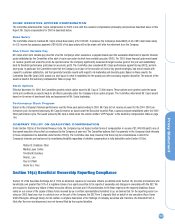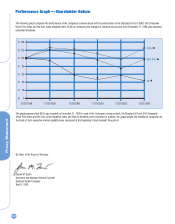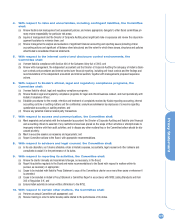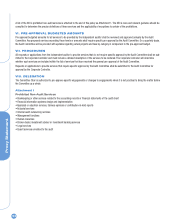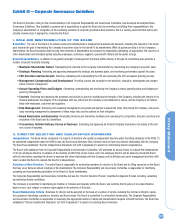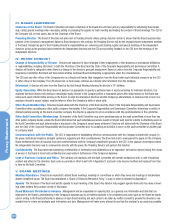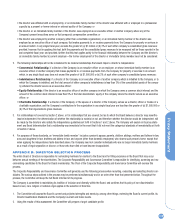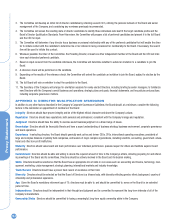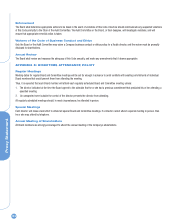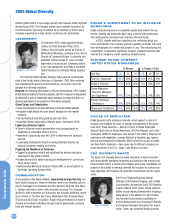Kodak 2003 Annual Report Download - page 131
Download and view the complete annual report
Please find page 131 of the 2003 Kodak annual report below. You can navigate through the pages in the report by either clicking on the pages listed below, or by using the keyword search tool below to find specific information within the annual report.
Proxy Statement
131
while still providing the desired information. In the event of a pressing need for the Board to meet on short notice or if such materials would otherwise
contain highly confidential or sensitive information, it is recognized that written materials may not be available in advance.
To prepare for meetings, directors should review these materials in advance. Directors will preserve the confidentiality of all materials given and informa-
tion provided to the Board.
Board Presentations
As a general rule, presentations on specific subjects should be sent to the Board members in advance so that Board meeting
time may be conserved and discussion time focused on questions that the Board has about the material. On those occasions in which the subject matter
is too sensitive to distribute in written form, the presentation will be discussed at the meeting.
Strategic Planning
The Board will review the Company’s long-term strategic plan during at least one Board meeting each year specifically devoted
to this purpose.
Executive Sessions
The non-management directors will regularly meet in executive session, without management, at least four times per year in
connection with regularly scheduled Board meetings. The Presiding Director will preside at all of these executive sessions. If the Presiding Director is not
present, the independent directors will choose another independent director to preside at the executive session.
When all of the non-management directors are not independent, the independent directors of the Board will meet in executive session, without the man-
agement directors and other members of management, at least one time per year in connection with a regularly scheduled Board meeting. The Presiding
Director will preside at this executive session. If the Presiding Director is not present, the independent directors will choose another independent director
to preside at the executive session.
VI. COMMITTEE MATTERS
Committees
The Company has five standing committees: Audit Committee, Corporate Responsibility and Governance Committee, Executive
Committee, Executive Compensation and Development Committee, and the Finance Committee. Each committee will have the duties and responsibilities
delegated to it in its charter and in the Company’s bylaws. The Board may form a new committee or disband an existing committee depending on cir-
cumstances.
Independence of the Board Committees
Each committee of the Board will be composed entirely of independent directors (with the exception of
the Executive Committee whose membership will include the Chairman of the Board).
Committee Agenda
The Chair of each committee, in consultation with the appropriate members of the committee and management, will develop the
committee’s agenda for each meeting. Each committee will issue a schedule of agenda subjects to be discussed for the ensuing year at the beginning of
each year (to the degree these can be foreseen).
Assignment and Rotation of Committee Members
The Corporate Responsibility and Governance Committee is responsible, after consultation
with the Chairman of the Board, for making recommendations to the Board with respect to the assignment of committee members and Chairs. After
reviewing the Corporate Responsibility and Governance Committee’s recommendations, the Board is responsible for appointing the committee Chairs and
members. Consideration will be given to rotating committee Chairs and members periodically at approximately three-year intervals, but the Board does
not believe that such a rotation should be mandated as a policy because there may be reasons at a given point in time to maintain an individual direc-
tor’s committee Chair or membership for a longer period.
Committee Reports
At each Board meeting, the Chair of each committee, or his or her delegate, will report the matters considered and acted upon
by such committee at each meeting or by written consent since the preceding Board meeting, except to the extent covered in a written report to the full
Board.
VII. DIRECTOR ACCESS TO MANAGEMENT AND INDEPENDENT ADVISORS
Access to Management
The Company expects and encourages its Directors to have regular contact with the Company’s senior management.
Accordingly, the Directors will have full access to the senior management of the Company. To assure that this access is not distracting to the business
operations of the Company, the Directors are asked to advise the CEO when contacting any member of senior management.
Access to Independent Advisors
The Board has the authority to engage independent legal, financial or other advisors, as it may deem necessary
and advisable in fulfilling its obligations and responsibilities, without consulting, or obtaining the approval of, management. Each committee of the Board
will also have such power.
VIII. DIRECTOR COMPENSATION
Compensation
The Company believes that compensation for non-management directors should be competitive and should encourage increased
ownership of the Company’s stock through payment of a portion of the Company’s compensation in stock, deferred compensation stock equivalents or
options to purchase the Company’s stock. The Corporate Responsibility and Governance Committee will periodically report to the Board on the status of
the Board’s compensation in relation to other large publicly held companies.


